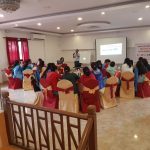Jim Pope and myself are extremely pleased to have gained Fusion Funding for our ‘Devils and Dolls’ research project. This project will investigate children’s responses to Roald Dahl’s (anti)heroines, looking at Matilda and The Magic Finger.
We have arranged to visit four local primary schools to conduct workshops with their current Year 6 students. Our methodology will employ a qualitative approach through a range of activities to be conducted in-class with groups of Year Six children. These hour-long sessions will revolve around discussing key scenes from the book and film and asking the children to give written and verbal opinions on whether these characters are heroic; how they are similar to/different from other heroes, and so forth. We currently estimate we will be running the session with around 100-200 children during the spring term.
We will be presenting our research as a conference paper (full abstract below) at the ‘Devils and Dolls’ conference (Bristol University, 27 March 2013) and intend to write our findings up into a full article over the summer. We’re very excited about this project which we think is an excellent opportunity to engage in primary research into a severely under-represented area: the responses of child readers to children’s fiction and its uses in education. We’re also especially delighted to have received this funding as it will enable us to make new networking contacts with local schools that will benefit BU in future research in this area. The study will directly inform our future teaching on Children’s Literature unit (BA English Level I) and we hope the proposed outputs will also promote the research and media teaching being done here at BU at both a national and international level.
Lost little girls (with scary powers): how do children respond to Roald Dahl’s heroines?
Jim Pope and Julia Round
Bournemouth University
Depictions of the child in literature for children are often stereotyped and dichotomous: for every Dennis the Menace there is a Peter Perfect, and it often seems there is little in between the two poles. But the depiction of the individual child can contain a similar tension within itself and some child characters (Matilda, The Magic Finger) are shown to have the capability for innocence and destruction in equal measure. These children are neither saintly nor monstrous, and thus they don’t easily fit the stereotypes of children’s literature. How do children interpret and respond to these characters?
This paper considers examples of the ‘little girl’ who, despite innocent appearance, can wreak great destruction. It begins by summarising critical opinion on the subject and the narrative stances of Dahl (whose morals and messages are generally very clear and didactic). Extracts, clips and theory are used to demonstrate that such characters cannot be clearly defined as a ‘devil’ or a ‘doll’ and that in fact there is a great deal of tension within each character. These dichotomies are explored and reflected upon using relevant extracts and clips.
However, ‘lit crit’ like this all too often begins and ends with a point of view or an argument to be built. When critics talk authoritatively about the tones, styles, messages and impacts of children’s lit, they are writing from the perspective of an adult with things to say. The response of adult critics is itself in a multiply dichotomous position – the adult commenting on the child’s interpretation of the child character created by an adult. How far do we wish to go with such conflicted criticism? Should we not instead consider how modern child readers understand these modern heroines – are they pleased to see characters like these behaving badly (sometimes) yet still winning?
The paper concludes with presentation of findings from a small reader-response study, in which we discussed extracts and clips from the books with groups of child readers. Their responses and reactions to these characters are used to reflect upon the critics’ conclusions and the texts themselves.
 Fusion Investment Fund: International approaches to the investigation of juvenile crime – a comparative analysis to inform UK policy.
Fusion Investment Fund: International approaches to the investigation of juvenile crime – a comparative analysis to inform UK policy.










 Up2U: New BU academic publication
Up2U: New BU academic publication New BU midwifery paper
New BU midwifery paper BU academic publishes in online newspaper in Nepal
BU academic publishes in online newspaper in Nepal Final day of the ESRC Festival of Social Science
Final day of the ESRC Festival of Social Science Using Art to enhance Research
Using Art to enhance Research ECR Funding Open Call: Research Culture & Community Grant – Application Deadline Friday 12 December
ECR Funding Open Call: Research Culture & Community Grant – Application Deadline Friday 12 December MSCA Postdoctoral Fellowships 2025 Call
MSCA Postdoctoral Fellowships 2025 Call ERC Advanced Grant 2025 Webinar
ERC Advanced Grant 2025 Webinar Horizon Europe Work Programme 2025 Published
Horizon Europe Work Programme 2025 Published Horizon Europe 2025 Work Programme pre-Published
Horizon Europe 2025 Work Programme pre-Published Update on UKRO services
Update on UKRO services European research project exploring use of ‘virtual twins’ to better manage metabolic associated fatty liver disease
European research project exploring use of ‘virtual twins’ to better manage metabolic associated fatty liver disease